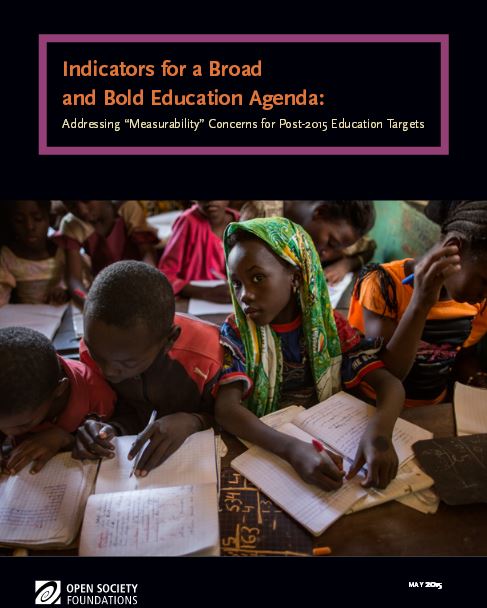Clarifying the Obscure: Facing the “Measurement” Challenge of the Education Post-2015 Targets By Dierdre Williams
By Dierdre Williams, Open Society Foundations.
 As the process of developing indicators for the Post-2015 education targets unfolds, some of the targets are at risk of being dropped on account of being ‘un-measurable.’ However, excluding more holistic but harder to assess educational targets will inevitably remove vital focus from some of the most important aspects of high quality education provision. The Open Society Foundations has identified three of the education targets (OWG[1] targets 4.1; 4.7; 4a & 4c and EFA-SC[2] targets 2, 5, and 6) that are particularly contentious and commissioned four papers proposing formulations of indicators that suggest ways of measuring what we care about rather than what is easiest to measure. The targets selected relate to: 1) determining what Relevant and Effective Learning Outcomes students completing primary and secondary education should achieve; 2) identifying Knowledge, Values, Skills, and Attitudes to Establish Sustainable and Peaceful Societies; and 3) securing Teachers and Safe, Inclusive, and Effective Learning Environments.
As the process of developing indicators for the Post-2015 education targets unfolds, some of the targets are at risk of being dropped on account of being ‘un-measurable.’ However, excluding more holistic but harder to assess educational targets will inevitably remove vital focus from some of the most important aspects of high quality education provision. The Open Society Foundations has identified three of the education targets (OWG[1] targets 4.1; 4.7; 4a & 4c and EFA-SC[2] targets 2, 5, and 6) that are particularly contentious and commissioned four papers proposing formulations of indicators that suggest ways of measuring what we care about rather than what is easiest to measure. The targets selected relate to: 1) determining what Relevant and Effective Learning Outcomes students completing primary and secondary education should achieve; 2) identifying Knowledge, Values, Skills, and Attitudes to Establish Sustainable and Peaceful Societies; and 3) securing Teachers and Safe, Inclusive, and Effective Learning Environments.
The first set of concrete and actionable goals to increase development and improve access to education for all children was laid out in 2000. The Education for All (EFA) goals and the Millennium Development Goal (MDG) for education emphasized literacy, numeracy, and life skills. The new post-2015 education goal and its related targets revisit these themes and also introduce new and controversial terrain, including education for sustainable development, cultivating lifelong learners, and developing global citizens.
The global community formulated the post-2015 targets through a broadly consultative process that has included states and civil society. The UN Open Working Group on Sustainable Development Goals (OWG) proposed ten targets, while the Education for All Steering Committee (EFA-SC) proposed seven targets. These two sets of targets are largely consistent, though there are some notable differences. Indicators appropriate for monitoring progress toward these targets are currently being developed.
Economist and philosopher, Amartya Sen has critiqued the MDGs, arguing that they narrowed the Millennium Declaration, on which they were based, by dispensing with anything that was not immediately measurable. There is a similar risk of narrowing in the current Sustainable Development Goals (SDGs) process. The three proposed education targets that are the focus of works commissioned by The Open Society Foundations (OSF) are particularly contentious and are being deemed ‘not measurable’ either because they lack specificity or because data for proposed measures are ‘currently unavailable.’ This raises an important question: How can we start valuing practices and outcomes of teaching and learning that are difficult to reduce to numbers?
It’s not just that measurable education goals aren’t enough—our concern is that excluding more holistic but harder to assess educational targets from systems of accountability will inevitably remove vital focus from some of the most important aspects of high quality education provision.
The four papers commissioned by the OSF suggest formulations of indicators for the proposed EFA-SC and OWG targets relating to: 1) determining what Relevant and Effective Learning Outcomes students completing primary and secondary education should achieve; 2) identifying Knowledge, Values, Skills, and Attitudes to Establish Sustainable and Peaceful Societies; and 3) securing Teachers and Safe, Inclusive, and Effective Learning Environments.
>>Read the full text of the four commissioned papers as well as a synthesis report.
These three targets (OWG targets 4.1; 4.7; 4a & 4c/EFA-SC targets 2, 5, and 6) are at risk of being excluded from the final formulation of the SDGs in response to practical concerns about the number of targets being excessive as well as concerns that targets such as these “rely too much on vague, qualitative language rather than hard, measurable, time-bound, quantitative targets.”[3]
The indicator frameworks presented in these commissioned works reflect the authors’ diverse thinking, rather than consensus on any of the issues explored. The annex report that synthesizes the commissioned works lays out the full text of the indicators proposed in the commissioned papers. The proposed indicators highlight the crucial need to capture more holistic data that can convey the complexity and diversity of national systems. These proposals are intended as a resource for policymakers and advocacy groups as the process to settle the new SDGs unfolds.
Dierdre Williams is a Senior Program Officer in the Education Support Program, Open Society Foundations. Email: dierdre.williams@opensocietyfoundations.org
NORRAG (Network for International Policies and Cooperation in Education and Training) is an internationally recognised, multi-stakeholder network which has been seeking to inform, challenge and influence international education and training policies and cooperation for almost 30 years. NORRAG has more than 4,200 registered members worldwide and is free to join. Not a member? Join free here.
[1] UN Open Working Group on Sustainable Development Goals.
[2] Education for All Steering Committee.
[3] International Council for Science. (2015). Review of targets for the Sustainable Development Goals: The Science Perspective. Retrieved from http://www.icsu.org/publications/reports-and-reviews/review-of-targets-for-the-sustainable-development-goals-the-science-perspective-2015

Pingback : Measurement Fetishism | NORRAG NEWSBite
Pingback : NORRAG – Measurement Fetishism By Steven Klees - NORRAG -